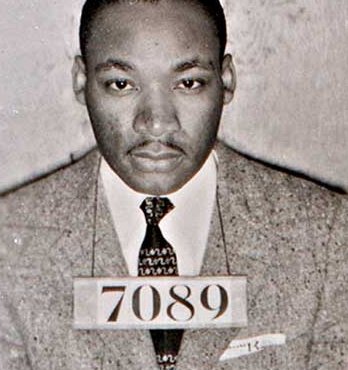 Biographer Stephen Oates (Let The Trumpet Sound) called The Letter from Birmingham Jail “the most eloquent and learned expression of the goals and philosophy of the nonviolent movement ever written.” The speech illustrates the principle of “just” and “unjust” laws:
Biographer Stephen Oates (Let The Trumpet Sound) called The Letter from Birmingham Jail “the most eloquent and learned expression of the goals and philosophy of the nonviolent movement ever written.” The speech illustrates the principle of “just” and “unjust” laws:
“…there are just laws, and there are unjust laws. I would agree with St. Augustine that “An unjust law is no law at all.” Now, what is the difference between the two? How does one determine when a law is just or unjust? A just law is a man-made code that squares with the moral law, or the law of God. An unjust law is a code that is out of harmony with the moral law. To put it in the terms of St. Thomas Aquinas, an unjust law is a human law that is not rooted in eternal and natural law. Any law that uplifts human personality is just. Any law that degrades human personality is unjust. All segregation statutes are unjust because segregation distorts the soul and damages the personality. It gives the segregator a false sense of superiority and the segregated a false sense of inferiority.”
And the appropriateness of the church confronting societal injustices:
There was a time when the church was very powerful. It was during that period that the early Christians rejoiced when they were deemed worthy to suffer for what they believed. In those days the church was not merely a thermometer that recorded the ideas and principles of popular opinion; it was the thermostat that transformed the mores of society….They were too God-intoxicated to be “astronomically intimidated.” They brought an end to such ancient evils as infanticide and gladiatorial contest.
Here is the full-text of the The Letter from Birmingham Jail.
HT: Jonathan Parnell
Related: In this video, actor Cory Jones reads Dr. King’s famous letter. [HT: Justin Taylor — who rightly notes that King was “a man of moral failing and neo-orthodox theology but in certain areas a man of tremendous moral courage.”]